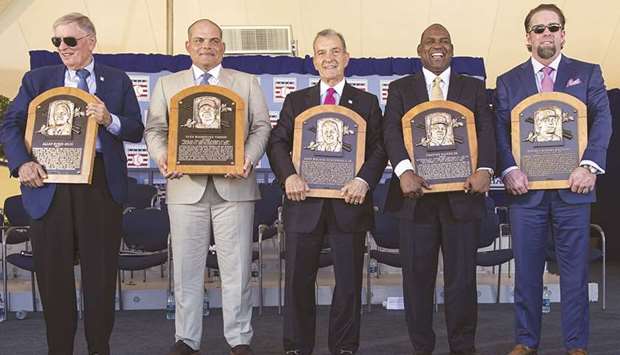Tim Raines, enshrined in the Baseball Hall of Fame in Cooperstown, New York, on Sunday after the maximum 10 years on the ballot, was a fitting final speaker at Sunday’s induction ceremonies.
But Raines wasn’t alone among the five newest Hall of Famers to cite perseverance and persistence in putting them among the game’s greats. Raines was joined by fellow former players Jeff Bagwell and Ivan Rodriguez as well as two-time World Series-winning general manager John Schuerholz and former Major League Baseball commissioner Bud Selig in entering the Hall.
Raines, who ranks fourth all-time in stolen bases (808) and is among the top 50 all-time in walks and times reached base, is the first player to be inducted in his final year of eligibility on the baseball writers’ ballot since Jim Rice, who was elected in his 15th try in 2009. “I’ve been asked that question for the past 10 years: ‘What is the reason why you haven’t gotten in?’” Raines said. “Thank God I don’t have to answer that question anymore.”
Bagwell, who grew up in Connecticut, said he listened to his parents’ advice to never quit — on or off the field — as he tried to realize his dream of playing for the hometown Boston Red Sox. “I wish I had quit a couple of jobs that I had,” Bagwell said — recalling a dishwashing job in particular. “Sometimes I probably should have quit baseball, too,” said Bagwell, but he parlayed a 1990 trade from the Red Sox to the Astros into a 15-season career in Houston, where he batted.297 with 449 homers and 202 stolen bases.
Rodriguez, nicknamed Pudge because of his diminutive stature, recalled trying to make himself taller as a child by hanging from a rope. He ended up as one of the best all-around catchers in baseball history and the position’s leader in hits (2,844), games caught (2,427) and Gold Gloves (13), mostly with the Texas Rangers. “Well, look at me,” an emotional Rodriguez said.”The kid hanging from that rope, the kid they called Pudge — I am here on this stage in this special place, this baseball heaven called Cooperstown.”
Selig, owner of the Milwaukee Brewers before taking on the role of commissioner from 1992-2014, led the game through a period that included the season-killing strike of 1994 and the influx of performance enhancing drugs. “The 1994 strike was the most painful experience of my life,” said Selig, who drew some boos during his speech.

(from left) Bud Selig, Ivan Rodriguez, John Schuerhotz, Tim Raines and Jeff Bagwell pose with their Hall of Fame plagues.
